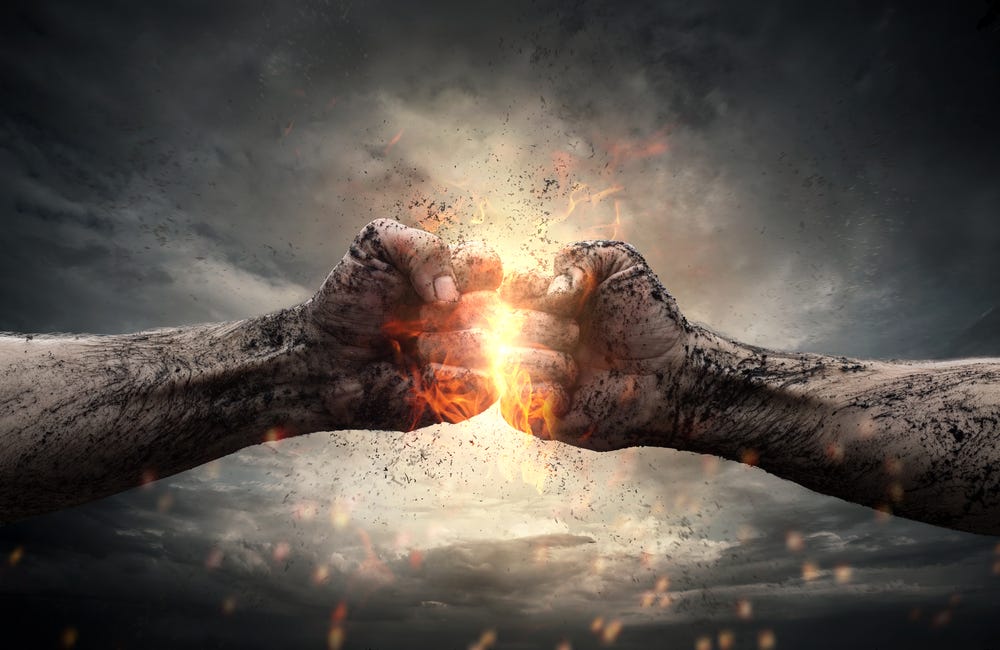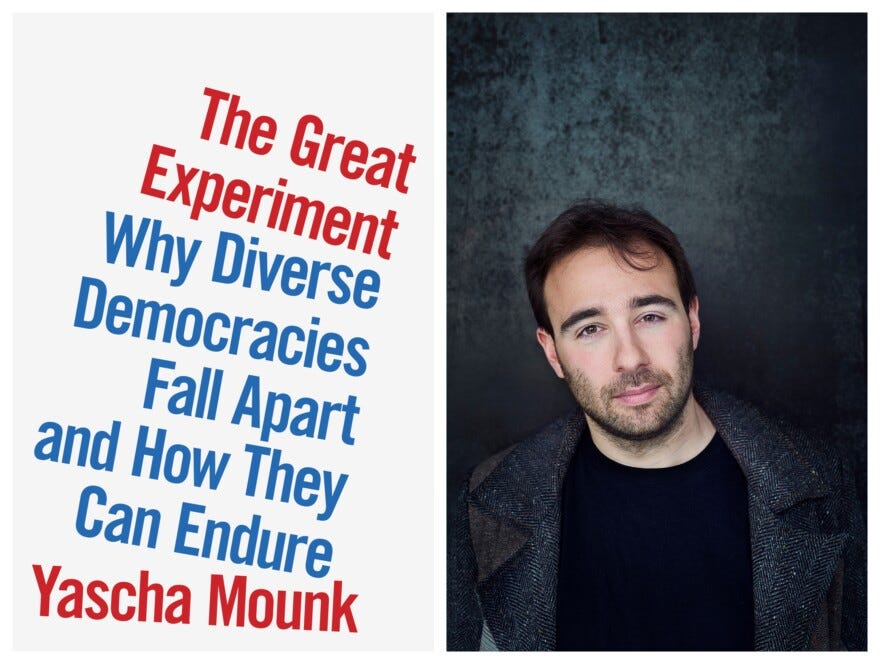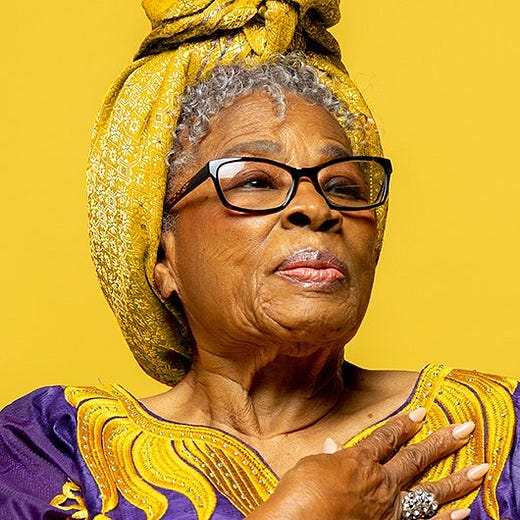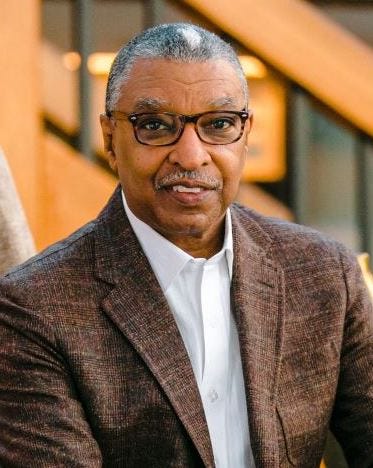E-Pluribus | June 20, 2022
The argument for fighting fire with fire, how to make pluralism work, and an alternative to the 1619 Project.
A round-up of the latest and best writing and musings on the rise of illiberalism in the public discourse:
Abigail Shrier: In Defense of Political Escalation
Frustration over cultural decline along with the arrival of Donald Trump on the political scene gave rise to fight-fire-with-fire thinking on the right. Abigail Shrier, no conservative herself, makes the case at Bari Weiss’s Common Sense Substack that using progressives’ own tools against them may sometimes be necessary to gain back lost ground.
Mandel is right: Child Protective Services should not be sent after these families. Parents ought to be free to make all kinds of decisions regarding what ideas to expose their children to, how and when—especially with regard to matters that we typically consider private and deeply personal: Religion is one. Sexuality, another.
But here’s the hitch: as with so many of our institutions, CPS has already become thoroughly politicized and weaponized by the left. Dozens and dozens of loving parents have told me over the last two years that CPS showed up at their homes or threatened their custody or even testified against them in court, all for the sin of failing to “affirm” their minor child’s newly-announced gender identity or vetoing the kid’s immediate medical transition.
[ . . . ]
Here is the problem: Almost every liberal will be content to allow our institutions and corporations to punish conservatives as long as they themselves remain unscathed. They may feel a pang of discomfort watching books deleted from Amazon, but until it is a book of theirs, they will continue to show a remarkable disinclination to speak up. (Yes, with the important exception of brave souls like J.K. Rowling, Elon Musk and Joe Rogan. And the moment liberals speak out against such censorship, they are accused of being right-wing and lose the left’s protection.)
[ . . . ]
Those waiting on the mythical pendulum to “swing back,” should stop holding their breath. The gender activists are True Believers, akin to jihadists: no amount of reasoning diminishes their resolve, no appeal to data brings them pause, no urge to consider the sanctity of American liberties will convince them to cool it.
Read it all.
Peter C. Meilaender: Democracies and Diversity
Yascha Mounk of Persuasion has written a new book examining the effects of diversity in a democracy. In a generally positive review for the Dispatch, Peter Meilaender lays out Mounk’s main arguments, but finds the book somewhat wanting in practical solutions for the challenges faced by a pluralistic society.
In The Great Experiment, Yascha Mounk, founder of the online newsletter Persuasion, sets out to answer that question. He is cautiously optimistic. The innate human tendency to divide into competing groups poses a stark challenge to left-liberal dreams of easy cosmopolitan harmony among diverse races, religions, and cultures (dreams that match Mounk’s own instinctive preferences, as he admits). But this same groupishness can be a source of social solidarity, binding people together rather than pitting them against one another. Furthermore, the significant gains made by underprivileged or oppressed minorities over the past 75 years demonstrate that our decisions, both political and personal, can mitigate the forces dividing us.
Mounk’s argument proceeds in three stages. In the first, after summarizing the psychological evidence for human “groupishness,” he analyzes the different problems from which diverse societies often suffer: anarchy, when conflict erupts among groups in the absence of a strong civil authority to keep the peace; domination, when one group oppresses others, either legally, as in slavery, or more subtly, by exercising hegemonic cultural influence; and fragmentation, when power-sharing schemes reinforce ethnic, religious, or linguistic lines. Institutions that foster interaction among groups can guard against these dangers but only when the groups meet as true equals, pursuing common goals with incentives for cooperation.
[ . . . ]
Mounk’s concluding chapter, which begins with a brief apology for the difficulty of offering policy solutions for vast social problems, feels a bit like throwing things at the wall to see what sticks. He offers a range of suggestions for fostering an inclusive, egalitarian society in which citizens and the groups to which they belong flourish and interact. These include the promotion of economic growth through spending on research and development; assuring that access to the benefits of growth are shared by means of progressive taxation, a global minimum tax rate for corporations, and apprenticeship programs; an expanded social safety net including access to health care, paid family leave, and perhaps a basic income; expanded access to education; an end to race-conscious policies; changes to rules in the House of Representatives that would let less partisan bills come up for debate; ranked-choice voting; and the use of nonpartisan districting commissions to end gerrymandering. None of these suggestions receives much discussion; some are advanced in only a single sentence. What Mounk does not mention is also sometimes of interest. For example, his criticism of race-conscious policies seems to imply an end to affirmative action; but those two words appear only once in the book, in a very different context and without discussion. Similarly, on the topic of educational access, Mounk mentions the not-very-interesting idea of early childcare and (I infer) pre-K schooling, but he says nothing about charter schools or school choice.
Read it all here.
Robert L. Woodson Sr. : Heroes Arose From the Brutality of Slavery
Conservatives were quick to criticize the New York Times’s 1619 Project as error-ridden and biased, but in the Wall Street Journal Robert Woodson Sr. says there is plenty we can and should learn from the history of slavery in the United States. Focusing on how the country has and continues to overcome the terrible legacy of that evil institution provides lessons all Americans can benefit from.
Bridget Mason, later nicknamed Biddy, was born in 1818 as a slave to a Mississippi man named Robert Smith. After walking 1,800 miles to follow Smith to California, she successfully sued him for her freedom. As a free woman, Biddy worked as a midwife and nurse, carefully saving all she could. She used her savings to buy land in the rapidly growing city of Los Angeles. She eventually became the wealthiest and most influential black American west of the Mississippi, and she used her fortune to fund charities and serve the poor.
[ . . . ]
The New York Times’s “1619 Project” posited that the evil of slavery was the heart of America’s founding. If that is so, the only American thing about Biddy Mason’s story is what Robert Smith did to her. But her experience in slavery doesn’t define what her life meant to her or to the countless people she touched. What she did to get free, and what she did once free, is every bit as American as the rest of her story.
A group of scholars rebuked the “1619 Project,” expressing reservations about it and the accompanying curriculum. They said the project contained factual errors that suggested “a displacement of historical understanding by ideology.” More important, the “1619 Project” defined all American history as the story of such men as Robert Smith, who was average at best, while such remarkable woman as Biddy Mason can be understood only as Robert Smith’s slave.
Stories such as Biddy Mason’s, taught with even reasonable competence, can inspire schoolchildren of all races and backgrounds. Who wouldn’t be inspired by someone who, forbidden to learn to read or write, sponsored the construction of the first black church in Los Angeles, which has thousands of members today? Such heroes as Mason can give all of us, regardless of race, a framework for understanding our past and building our future together. They can give us the tools to reconcile with one another and discern justice in light of historical reality.
Read the whole thing.
Around Twitter
A few thoughts on of Juneteenth:
And a contrarian take on making Juneteenth a federal holiday:
Colin Wright on one of the fundamental contradictions of the “gender identity” movement:
And finally, via Conor Friedersdorf, the Washington Post’s Dan Drezner with some parting thoughts on public discourse as he wraps up eight years with the Post:











